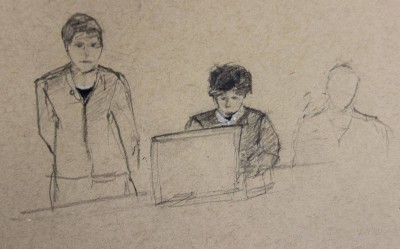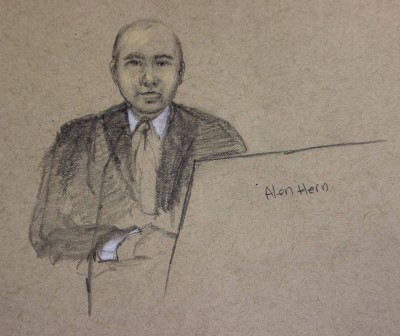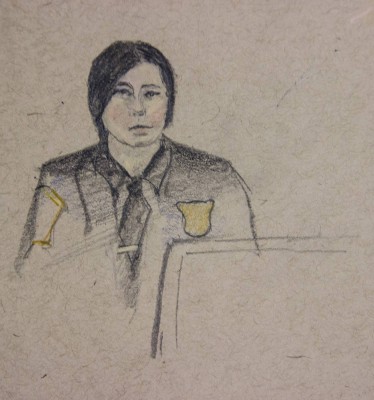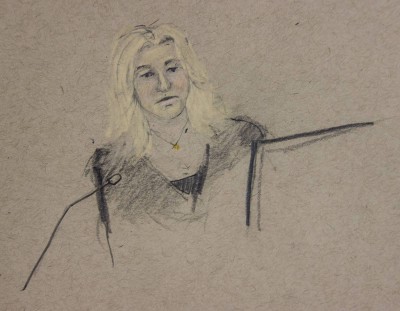
Thursday marked day two of trial testimonies for Dzhokhar Tsarnaev, the 21-year-old who allegedly placed two bombs at the Boston Marathon finish line in 2013, killing three and injuring more than 260. He is charged with 30 federal counts, to all of which he has pled not guilty.
Following opening statements Wednesday, the prosecution jumped straight into calling upon witnesses, a process that was continued Thursday, as the prosecuting team called 10 more people to the stand over the course of Thursday’s court time.
Thursday’s witnesses ranged from FBI agents to local police officers, from victims to family members of victims. The testimonies varied in length and detail, some providing background about security and investigation tools used on April 15, 2013, while other witnesses shared personal recollections and stories in an effort to help the jury come face-to-face with the emotions they had felt on that day.
Below are brief witness profiles, summarizing the testimony offered by each witness when questioned by the prosecution in court on Thursday.
Frank Chiola
Employed by the Boston Police Department for almost 10 years, South End District Force Officer Frank Chiola said he was on duty during the 2013 Boston Marathon. His responsibility: ensure public safety. In his eyes, the marathon was a “good day for everyone.” Around 2:45 p.m., he said, he heard a loud explosion and the sudden screaming of thousands of people on Boylston Street. As he ran toward the sound of the first explosion, crossing the street from his post, he heard the second explosion.
“When I got there, there were people on the ground, saw blood everywhere,” he said. “People’s faces — you couldn’t tell who was alive and who was dead.”
Chiola attempted to assist the injured for 10 to 15 minutes after the second explosion, performing CPR on one woman who he later learned was Krystle Campbell, a 29-year-old from Medford, who died as a result of the bombing, as told by the prosecution in their opening statements Wednesday.
“She was suffering. She was in pain,” Chiola said. “From the waist down, it’s really tough to describe, complete mutilation. That’s all I can say.”
Jeffrey Bauman
Walking into the courtroom with two prosthetic legs, Jeffrey Bauman recalled the morning of the marathon — waking up early, making signs for his girlfriend who would be running in the race and finding the ideal location at the finish line to watch. Shortly after the four-hour mark, he said, someone bumped into him. As Bauman described it, the person was alone and “didn’t look like he was having fun like everybody else.”
Moments later, Bauman turned around to see the man had disappeared but the backpack he had been carrying was lying on the ground unattended.
“I just thought it was weird,” he said. But he also comforted himself. “You’re in Boston. Stuff like this just doesn’t happen,” he thought.
Bauman had just told his friends they should leave when he saw a flash and heard two pops.
“It smelled like the Fourth of July … I lifted my head and that’s when I first saw the chaos behind me,” he said. “I could see my bones and flesh sticking out. I just went into tunnel vision. I wasn’t thinking about anything but my legs at that point.”
Bauman was sent to the hospital for three surgeries, two of which he said he couldn’t remember. When he woke up in a hospital bed at Boston Medical Center with both legs amputated and hooked up to breathing tubes, he remembered the “suspicious kid” who bumped into him and decided he needed to tell someone. Shortly after, he said, the FBI and State Police were in his room, asking for any information he could offer.
“I only had one goal in my mind at that point. It was to tell whoever I could what I knew,” he said. “It was kind of a relief to know that I got to help out and do my part.”
Richard Claflin
FBI special agent Richard Claflin, currently a member of the intelligence squad in the Boston Office, assisted the process of preserving evidences on April 15, 2013. He was initially assigned to be on a night shift in Rhode Island, but was transferred following the bombings.
“I directly went to Boylston Street, went to California Pizza Kitchen, approximately a block away,” Claflin said. “There was an initial response team by the FBI, and they were setting up a command post.”
Claflin was dispatched to the secondary command post at the Westin Hotel, approximately two to three blocks away, and responsible for recovering, collecting and preserving any potential video evidence found. On the night of the marathon, Claflin said, the team collected 35 to 40 videos.
The Evidence Response Team began to document the evidence: where, who and when it was collected, Claflin said.
“On Saturday, we had more information on exit route, covering any potential exit route of the subjects in this case,” he said.
James Marinelli
A special agent for the FBI for 17 years, James Marinelli now works at the FBI in Boston. Upon taking the stand Thursday, he emphasized the importance of collecting of evidence and following “all integrity of evidence.”
After the bombs went off on April 15, 2013, Marinelli was on Boylston Street within 30 minutes to start gathering any evidence he could.
James Tyra
James Tyra, FBI Boston Field Office Computer Scientist, investigated all manners of computer-related crime and is trained to gather digital evidence.
“I started approximately 5 p.m. on the day of the Boston bombing. I was part of the team that was reviewing and processing digital evidence,” he said.
Tyra said he and his team started extracting videos from the surveillance system from Forum, the location of the second explosion, and found evidence regarding the bombings.
“A person approximately five minutes before the bombing, walked up to a place in front of the Forum with a backpack, casually turned, and set the backpack down,” he said. “And then a bomb went off very shortly after that.”

Alan Hern
Teacher and varsity football coach Alan Hern visited Boston from California for the 2013 Marathon with his family. His wife, who was three months pregnant, had qualified for the race. He and his family dropped his wife at the start of the race and went to Forum to watch it.
“First explosion, everyone turned. I didn’t think anything was out of the ordinary. I thought maybe it was a gas blown up or something like that,” Hern said. “We were kinda just watching a train of smoke. And then the second bomb blast right in front of them, and then I know it’s not normal.”
Following the explosions, Hern made sure his daughter Abigail was safe and searched for his 11-year-old son, Aaron. When Hern found him, Aaron was behind a fence and, in Hern’s words, his body was “full blood, something seen in a war movie.” Aaron was brought to Boston Children’s Hospital, where he received more than 60 staples in his leg and stayed for nine days.
Before leaving the Boylston Street area, Hern said he looked around to “take in the scene.”
“The last thing I did see was Martin Richard [an 8-year-old who died in the bombings] on the sidewalk, and I didn’t think he was alive,” he said. “At that point, there was nothing left to do.”

Lauren Woods
A Boston Police officer for four-and-a-half years and a Dorchester native, Lauren Woods had known the Richard family since 2006. Martin Richard, the 8-year-old son of Denise and William, was fatally injured by the second explosion on April 15, 2013.
Woods was not assigned to monitor the marathon in 2013. Around 2:30 p.m., she said, she was dispatched with her partner to the Prudential Center for an alleged robbery at the Microsoft store. Several minutes after arriving at the store, while speaking to the manager, people started screaming, she said, and running away from Boylston.
“As people were running through screaming, I knew something was wrong, so I left the situation I was in,” she said. “I started running against the grain.”
Soon after, Woods found herself in front of Forum, where she saw an Asian female on the ground, surrounded by an EMT and citizens in plain clothes. While others were doing chest compressions, Woods noticed the girl was vomiting, so she knelt next to her and began clearing her airways of vomit to make sure she was getting a breath. Woods later learned, when a woman nearby found the victim’s wallet, that the girl was Lingzi Lu, a Boston University graduate student and one of the three people who died as a result of the explosions.
“I made eye contact with her … her eyes appeared shaky, like she couldn’t understand what was going onto her,” she said. “I just kept talking to her when I was doing chest compressions saying, ‘Lingzi, stay with us. You can do this. Stay strong.'”
When Lingzi’s parents traveled from China to Boston, Woods said she went to Boylston Street with them.
“I just told them that she wasn’t alone when she died.”

Roseann Sdoia
On the day of the marathon, Sdoia attended a Red Sox game with several friends and then walked from Fenway Park to the Forum restaurant, waiting to see one of their friends cross the finish line. While waiting for her friend, who had just run past Kenmore Square, Sdoia went inside Forum to get a drink. Upon receiving an alert that her friend was coming soon, she left her drink with the hostess and told her she’d be back in a few minutes.
Sdoia was outside for about 10 minutes, she said, when the first bomb went off. A guy to Sdoia’s left began yelling for people to get in the street, but she knew she was too short to make it over the barricade, so she decided instead to walk to her right.
“I ran to my right, and I saw two flashes of white light explode at my feet,” she said. “I remember, and I think it’s probably before I hit the ground, but in my head, it registered that I lost my leg.”
When Sdoia came to, she said, there was blood pouring out of the place where her knee was supposed to be.
“I was starring in a horror movie,” she said. “I knew I was bleeding out, and I needed to stay calm and stay conscious because if I didn’t, I would die.”
Two men specifically aided Sdoia following the explosion, one a physician’s assistant and the other a 22-year-old student from Northeastern University. They straightened out her right leg — which Sdoia described as the “most excruciating pain ever, that one could ever anticipate” — and they applied a belt as a tourniquet to stop the bleeding in her right leg.
Arriving at Massachusetts General Hospital, Sdoia said, she tried to keep her eyes closed but listen to what was going on around her. The next time she woke up, it was Tuesday evening, and her leg had been amputated below the knee.
“I vaguely remember the doors opening up [to the hospital] because in my mind, I had kept myself alive to this point, and after this point, it was up to the doctors to save me,” she said. “There was nothing else I could do at that point.”
Thomas Barrett
A member of the Boston Police Department for 10 years, Thomas Barrett has been assigned to work at the Boston Marathon finish line three times, and April 15, 2013 was one of the three.
When the first bomb went off, he said, there was white smoke first, then an orange fireball and then black smoke.
“If you’ve ever been to the Fourth of July, that’s what it sounds like on the Esplanade,” he said. “You could feel the heat on your face.”
Barrett said he saw 20 to 30 injured people in front of the Forum restaurant.
“There was blood, a lot of blood,” he said. “It was brutal.”
William Richard
William Richard had been attending the marathon with his wife for years, long before they even had kids. On April 15, 2013, William and his wife Denise were at the parade with their three children — Henry, Martin and Jane.
Mid-afternoon, the family decided to get ice cream and stand closer to the finish line. They eventually found a location — outside the Forum restaurant.
When the first bomb went off, Richard said it felt as if time had slowed down. Everyone around him just looked toward the finish line and wasn’t sure what to make of the situation. Richard said he remembers thinking, “OK, we should probably go.”
“You couldn’t even predict how bad it was,” he said. “You just knew it couldn’t be good.”
The last thing Richard remembers before the second bomb went off is beginning to hoist himself over the barricade so that he and his family could leave. The second explosion, which Richard described as “ear-piercing,” blew him into the street. Richard said he stood up and immediately walked back where he came from, lifting the fallen barricade and looking for Denise and his three children. Henry, the oldest, sustained minor injuries. Jane lost her left leg. Denise lost her sight in one eye. Martin, however, was in a much more serious condition, Richard said.
“I saw Denise and other people hovering over, trying to help Martin, and I knew that I needed to get back to help Jane,” he said. “When I saw Martin’s condition, I knew he wasn’t going to make it … I saw a little boy who had his body severely damaged by an explosion, and I just knew from what I saw that there was no chance … I knew in my head that I needed to act quickly or we might not only lose Martin, but we might lose Jane too.”
After several trips to two separate hospitals — Jane was taken to Boston Children’s and Denise was taken to Beth Israel Medical Center — Richard went home, knowing it would probably be a long time until he’d be home again.
“I took a shower, and it was just my time to kinda think about the days, weeks, months, ahead,” he said. “It was just my time to kinda get that awful smell off my body, but to really just put into perspective what had just happened to our family.”


















































































































catman • Mar 7, 2015 at 4:46 pm
Jeff Bauman has made hundreds of thousands of dollars and more to come from his book. There is no way to know if this guy is being truthful. He has a lot to gain, though.